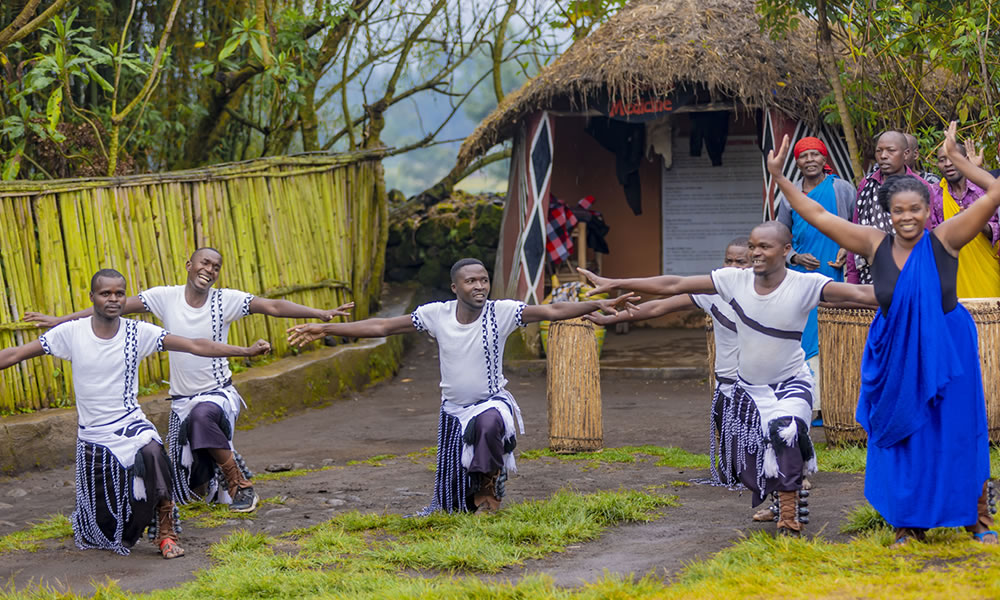Rwanda, widely celebrated for its breathtaking landscapes and mountain gorillas, is also a country steeped in rich cultural heritage. Beyond the wildlife and natural beauty, cultural expeditions offer visitors an intimate glimpse into Rwanda’s history, traditions, and way of life. From traditional dance and music to culinary experiences and ancient crafts, Rwanda Cultural Expeditions are as diverse and vibrant as its people.

Exploring Rwandan Culture
-
Intore Dance and Music
The traditional Intore dance is a cornerstone of Rwandan culture. Known as the “Dance of Heroes,” this captivating performance features warriors adorned in grass wigs, colorful attire, and spears, moving to the rhythm of drums and chants. Intore performances are often accompanied by a choir, showcasing Rwanda’s rich musical traditions. Visitors can witness these dances at cultural centers, festivals, and community-based tourism initiatives.
-
Iby’Iwacu Cultural Village
One of the most popular destinations for cultural expeditions is the Iby’Iwacu Cultural Village, located near Volcanoes National Park. This interactive experience offers visitors the chance to engage with local traditions, from learning about ancient hunting techniques to participating in banana beer brewing. The village, run by former poachers turned conservationists, highlights the importance of sustainable tourism in preserving both culture and nature.
-
Traditional Crafts
Rwanda’s artisans are renowned for their intricate craftsmanship, particularly in basket weaving. The iconic Agaseke baskets, known for their bold patterns and symbolism, are a testament to the skill and creativity of Rwandan women. Visitors can take workshops in weaving, pottery, or beading at craft centers such as the Rwanda Art Museum or local cooperatives like Gahaya Links. These sessions not only provide hands-on learning but also support community development.
Culinary Experiences
Food is an integral part of Rwandan culture, and culinary expeditions allow visitors to savor the country’s traditional flavors. A typical Rwandan meal consists of staples such as sweet potatoes, beans, maize, and cassava, complemented by fresh vegetables and tilapia from Lake Kivu.
Participating in cooking classes is a great way to learn how to prepare traditional dishes like isombe (cassava leaves with peanut sauce) or ugali (a maize-based porridge). Many tours also include visits to local markets, where travelers can explore the vibrant array of fresh produce, spices, and handmade goods.
Historical and Spiritual Exploration
Rwanda’s cultural expeditions also delve into its history and spiritual practices. The King’s Palace Museum in Nyanza, once home to Rwanda’s monarchs, provides insight into the country’s royal heritage. Visitors can see a replica of a traditional thatched palace and learn about pre-colonial governance and rituals.
For a spiritual journey, the ethnographic exhibits at the Rwanda National Museum in Huye (formerly Butare) showcase the cultural evolution of Rwandans, from ancient tools to ceremonial artefacts.
Supporting Local Communities
Cultural expeditions in Rwanda often emphasize community-based tourism, ensuring that local people benefit directly from visitor engagement. These initiatives promote cultural preservation, economic empowerment, and sustainable tourism.
Rwanda’s cultural expeditions offer an unforgettable journey into the heart of its traditions, art, and history. From dance and crafts to culinary delights and historical insights, these experiences deepen visitors’ appreciation of Rwanda’s identity. Beyond sightseeing, cultural tours forge meaningful connections with the people and stories that make Rwanda a truly remarkable destination. Whether you’re exploring traditional villages or learning a local craft, Rwanda’s cultural heritage promises an enriching and memorable adventure.
